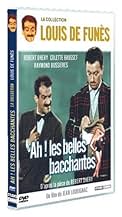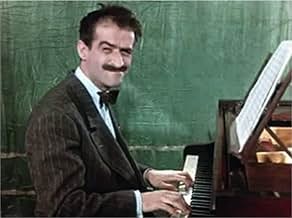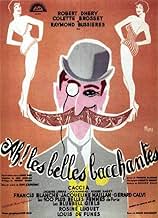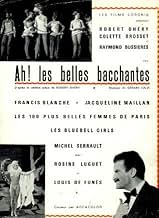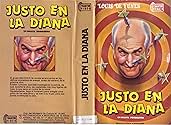IMDb-BEWERTUNG
5,1/10
578
IHRE BEWERTUNG
Füge eine Handlung in deiner Sprache hinzuA small-town policeman is informed that "naked women" are dancing in a revue at a local variety theater. Being the guardian of public morals that he is, he decides to stroll on down there an... Alles lesenA small-town policeman is informed that "naked women" are dancing in a revue at a local variety theater. Being the guardian of public morals that he is, he decides to stroll on down there and check it out for himself.A small-town policeman is informed that "naked women" are dancing in a revue at a local variety theater. Being the guardian of public morals that he is, he decides to stroll on down there and check it out for himself.
Roger Caccia
- L'homme chauve à 'La plage'
- (as Caccia)
Guy Piérauld
- Un musicien ambulant
- (as Guy Pierrault)
Empfohlene Bewertungen
This film appears to be aplauded by its own countrymen and derided by everyone else. I can only say, as an Englishman that I agree with my French counterparts! This film for me was a delightful surprise! It has to be viewed within the context in which it was made and anyone who thinks that the musical numbers are poor has really missed the point! The film captures in scenes of wonderfully absurd comedy, a rehearsal for a french revue in a second rate variety theatre. It was great fun to see Loius de Funes in an early supporting role, but I particularly like the whole feel of the film. At its most realistic, it really captures the feeling of being there in the theatre while chaos rules the rehearsal.
Many of the pieces are hilariously funny, not least the bathing hut scene on the beach and the monks finale piece. For anyone who cringes at the nudity, I was delighted to find it all left in, realistically and is it should be! Also nice to see Agfacolour, though I have to confess that the print I saw was a slightly faded Eastman colour print form my own archive. Never-the-less, a delight and one to be accepted for what it is. It is a delightful time capsule period piece and I loved it!
Many of the pieces are hilariously funny, not least the bathing hut scene on the beach and the monks finale piece. For anyone who cringes at the nudity, I was delighted to find it all left in, realistically and is it should be! Also nice to see Agfacolour, though I have to confess that the print I saw was a slightly faded Eastman colour print form my own archive. Never-the-less, a delight and one to be accepted for what it is. It is a delightful time capsule period piece and I loved it!
I was expecting a B-Movie French musical. After all, Dhéry, Blanche, DeFunès were superstars of low budget French films of that time. And it is in color! But I have hallucination in this unbelievable one hour 30 of pure mediocrity. Musical numbers are awful, and comedy is absolutely boring and stupid. And the songs? What songs? This is just a succession of bad numbers, one after another. The only one very rare thing about that thing is the nudity of women. It was not familiar at that time. In fact, some numbers are just there to show us topless women. It adds to the mediocrity! And try to find young Michel Serrault, the future great actor of French cinema, in a bit part as a musician, in his very first movie. Good luck!
As a lifelong Louis de Funès fan, I went into Ah! The Beautiful Priestesses of Bacchus expecting the same comedic brilliance that defines much of his work. Unfortunately, this film fell far short of those expectations.
The plot or lack thereof is one of the main issues. The movie meanders without much direction, leaving the viewer wondering what it's trying to achieve. There's very little action or humor to keep things interesting, and even de Funès himself seems underutilized, with none of the sharp wit or frantic energy that usually makes his performances so entertaining.
Despite trying my hardest to appreciate the film for what it is, I found myself increasingly disengaged as it dragged on. Eventually, I couldn't even finish it, which is rare for me with anything involving de Funès. Unless you're a die-hard completist for his filmography, this one is safe to skip.
The plot or lack thereof is one of the main issues. The movie meanders without much direction, leaving the viewer wondering what it's trying to achieve. There's very little action or humor to keep things interesting, and even de Funès himself seems underutilized, with none of the sharp wit or frantic energy that usually makes his performances so entertaining.
Despite trying my hardest to appreciate the film for what it is, I found myself increasingly disengaged as it dragged on. Eventually, I couldn't even finish it, which is rare for me with anything involving de Funès. Unless you're a die-hard completist for his filmography, this one is safe to skip.
Robert Dhéry (as he did again later on Theatre with "En sourdine, les sardines", a reference title to his movie "Vos gueules, les mouettes") offers a spoof on a revue in rehearsal with behind the stage problems of many kind, from undelivered costumes (what lead the movie to be restrained to minors of 16)as with a plumber. After a short introduction showing the police (Louis de Funès) eager to check if decency is respected, the rehearsal is shown in real time through the movie, and the fact it is a rehearsal allows unexpected auditions (and bad ones) as imposed by relations. Amateur (Colette Brosset) ruins a number, but there are also classic typical quality numbers with good rhythm as the "bath cabins on the beach" with the game of doors (un)expectedly showing or not the girl inside (what follows works by chronometer as Dhéry was found of all-visual number), another well-staged classic number is "the monks at dawn". A specific audition, where Dhéry plays on stage a silent musician along with Michel Serrault and others from movies "Branquignols" or "Bertrand Coeur de lion", (number re-used with new actors in "Vos Gueules les mouettes") comes from his play "La Plume de ma Tante" interpreted for months in London. Princess Anne of England came five times to see them then invited them to play that act at a private evening in front of Queen Elizabeth.(from Dhéry biography) Her Majesty expected a boring classical music act but understood quickly what she was offered. She promised to come see the play. Dhéry thought the play would be ended shortly, but more than five months later had to ask English spectators to offer their seats for the Royal visit. They accepted if they could stay aside and watch her entrance. During that "royal" show, (from TV interview of Robert Dhéry) another "by the chronometer" act around a "pissotière" (typical french - of the time - place for an "urgent need" for men)was apprehended as in the theater a fat laugh from someone unspotted was arriving regularly. Just before the act Dhéry was told no one could do anything to prevent it, as it was.. Prince Philip. Later "La Plume de ma Tante" was asked for Broadway, and received a Tony award for "Best musical of the year", in the same category than "My Fair Lady" and "West Side Story". Dhéry all surprised said "But we're not Americans.." and was answered on stage "Now you are !". After a long time in New-York (visited in theater by Harold Lloyd - Colette Brosset 's idol -, the Marx Brothers, Danny Kaye and lots of others, invited home by Harpo) with many appearances on TV talk-shows, Dhéry and his wife Colette Brosset decided not to stay in America as he had promised before to film "La Belle Américaine", so they came back to France. As a critic didn't like the previous directing of Robert Dhéry, he let Jean Loubignac direct "Ah! Les Belles Bacchantes". The same critic all-smiling asked him after release "But what not direct it ?". Robert tried to remind him it was because of him what was offered superb denial "I cannot have said that !". So Robert Dhéry directed his next movies (some along with Pierre Tchernia). Robert Dhéry died on December 3, 2004. The only time he didn't me laugh. Look at "Ah! Les Belles Bacchantes" with the flavor of its time. JcBernardo
I definitely can't agree with the previous comments. This movie is very good and very funny. It's not a De funès Movie, but a Branquignol's one, with Robert Dhery as himself, Colette brosset as a delicious ingénue, and De Funès is "le poulet" ( the chicken, this is the name we give to the policemen). He has only a supporting role. Of course, Mario David is the beautiful muscular man, jacqueline Maillan is herself ( Madame Maillan, the proprietary of the theatre) and Jacques Jouanneau the régisseur. Raymond Bussières is as good as usual,playing Raymond le plombier... the scene with Rosine Luguet at the beginning is really funny,and when he speaks to Robert Dhery about the diameter of the tubes it's very realistic. I'd say Jacques Legras ( as himself) is the main character. He is very good. Too bad he didn't make a great career later.
Well, the choreography is a parody of french music hall. Don't expect it to be good. it is not a musical movie but a parody. The 'défilé sans robes'(the dresses didn't come in time, so the girls make the show in underwear but Jacques Legras makes comment about the non existent taffetas dresses) is hilarious. Overall it is a good funny movie, a good adaptation of the stage performance.
There are many nude scenes, but this is no problem as it is quite normal for a french cabaret ( only Americans can pretend to make a movie about french cabaret without naked girls).
Louis de funès became a big star later.... In Pouic Pouic He was the husband of Jacqueline Maillan, and in Le petit Baigneur we find again Robert Dhery, Colette Brosset and Jacques Legras.... In Oscar mario David plays the same role, in "le grand restaurant" there is the same pianist and so on. This movie is full of reference for later movies of De Funès. I must admit only french from France can get all the fun from this movie and it is for limited audience, but it's from a time, and made by people who didn't even think their movie could be watched overseas or could last for 50 years. 'Vos gueules les mouettes' and 'Allez France' or les tontons flingueurs are better references (IMO) than la cage aux folles.
Well, the choreography is a parody of french music hall. Don't expect it to be good. it is not a musical movie but a parody. The 'défilé sans robes'(the dresses didn't come in time, so the girls make the show in underwear but Jacques Legras makes comment about the non existent taffetas dresses) is hilarious. Overall it is a good funny movie, a good adaptation of the stage performance.
There are many nude scenes, but this is no problem as it is quite normal for a french cabaret ( only Americans can pretend to make a movie about french cabaret without naked girls).
Louis de funès became a big star later.... In Pouic Pouic He was the husband of Jacqueline Maillan, and in Le petit Baigneur we find again Robert Dhery, Colette Brosset and Jacques Legras.... In Oscar mario David plays the same role, in "le grand restaurant" there is the same pianist and so on. This movie is full of reference for later movies of De Funès. I must admit only french from France can get all the fun from this movie and it is for limited audience, but it's from a time, and made by people who didn't even think their movie could be watched overseas or could last for 50 years. 'Vos gueules les mouettes' and 'Allez France' or les tontons flingueurs are better references (IMO) than la cage aux folles.
Wusstest du schon
- WissenswertesLouis de Funès's character is Michel Leboeuf, of the vice squad, and he often clucks and moves his arms like a chicken. One should know that in France, police officers are derogatorily known as "poulets" (chickens), as in English speaking countries they are called "pigs".
- VerbindungenFeatured in Louis de Funès - Die Macht des Lachens (2003)
Top-Auswahl
Melde dich zum Bewerten an und greife auf die Watchlist für personalisierte Empfehlungen zu.
Details
- Erscheinungsdatum
- Herkunftsländer
- Sprache
- Auch bekannt als
- Ah! The Beautiful Priestesses of Bacchus
- Produktionsfirmen
- Weitere beteiligte Unternehmen bei IMDbPro anzeigen
- Laufzeit1 Stunde 17 Minuten
- Sound-Mix
- Seitenverhältnis
- 1.37 : 1
Zu dieser Seite beitragen
Bearbeitung vorschlagen oder fehlenden Inhalt hinzufügen

Oberste Lücke
By what name was Die Knallschote (1954) officially released in India in English?
Antwort
